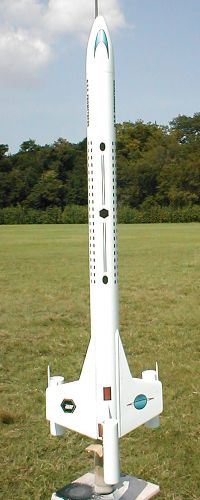| Construction Rating: | starstarstarstarstar |
| Flight Rating: | starstarstarstarstar |
| Overall Rating: | starstarstarstarstar |
| Diameter: | 1.33 inches |
| Length: | 21.00 inches |
| Manufacturer: | Red River Rocketry  |
| Style: | Futuristic/Exotic |

Brief:
The Prometheus is a relatively easy to build single stage rocket with a futuristic look. I got my kit from John as a
beta test kit. The rocket is 21" in length, flies on 18mm motors, and recovers by parachute. The unique design and
fantastic set of decals results in a model that looks fantastic on the launch pad. Another “not your normal”
rocket from John!
Construction:
A BT-55 body tube and balsa nose cone, 3 BT-20 pod tubes, standard 18mm engine mount with motor clip for positive
retention, laser cut fin sheet, two hardwood dowels, screw eye, two feet of Kevlar®®
line, a 2-foot long 1/8” elastic shock cord, 12” mylar parachute, 1/8” launch lug, and waterslide decal
sheet are provided.
The instruction sheet contains easy-to-follow, numbered instructions with lots of helpful illustrations. I sanded all of the tubes and centering rings, inside and out, to improve adhesion of parts glued onto or in them. The motor mount is standard installation, including an engine hook for positive motor retention, except the Kevlar® cord is wrapped around the motor tube between the centering rings and then extended up through a notch in the outer edge of the upper ring. I didn’t use the Kevlar® in this manner though, as I like the shock cord attachment located so I can inspect it for possible replacement. The “small parts” bag included in the kit is great for keeping all the little things in one place. A fin marking guide is supplied to properly align the fins.
John's instructions for attaching the fins using a “double glue joint” are very good. This method helps assure that the fins are aligned as placed, since they “set” much quicker. The laser-cut fins were perfectly matched, so minimal sanding was required except at the joint of the two pieces that form the main wing-fins. The angle for gluing the wing-fins on is easy, since they just lay down even with the bottom of the body tube as it lies on the worktable. The hardwood dowels are then inserted into the gap to strengthen the joint as well as being for decoration. The vertical fin is then glued on the top of the tube. After those dry, a small fin is then glued onto the edge of each wing-fin on the underneath side. I added a laser cannon (a.k.a. toothpick, not provided) in the joint between the small fin and the wing-fin to strengthen the joint. Once those have dried, a pod tube is centered and then glued at the marks onto the small fins. An angled section of the last pod tube must be removed using the provided template before attachment to the vertical fin. A spent motor inserted inside the tube provides support for the cut. This is a little difficult for novices, but use a sharp hobby knife, take it slow and you’ll get a beautifully scalloped tube. The rocket went together fairly rapidly, only delayed having to wait for the glue joints to dry.
For shock cord attachment I used my standard tri-fold paper attachment (not provided). I installed the provided Kevlar® in the shock cord attachment with a loop at the end to attach the elastic shock cord. To minimize abrasion from the Kevlar® against the body tube, I soaked in CA around the top 1/2" of the body tube and tied the Kevlar® so the knot in the loop meets the lip of the body tube. The launch lug is cut in half with one piece attached at the back of the model and the other piece attached further up. Install the screw eye into the nose cone and attach the shock cord and you’re almost done. The parachute comes in a separate plastic bag, complete with instructions. Once assembled, you’re ready for finishing.
Finishing:
The balsa nose cone and fins require standard finishing. I used Elmer's Fill 'n' Finish but any balsa filler will
work fine. I also filled in at the dowel/wing-fin joints and sanded to a smooth finish. The whole rocket was painted
white after primer and sanding. The decals lay down nicely and look great on the rocket. I think I got really lucky
with the decals this time. I didn't even tear one!
Construction Rating: 5 out of 5
Flight:
My only flight so far was on a B6-4. The tail waggled after the initial thrust ended just before the coast phase. I'm
not sure why that happened. After flight, I checked the fin angles. I do have a very slight angle on the vertical fin,
so maybe that's the cause. Otherwise, the flight was perfectly straight with ejection right at the top.
Recovery:
The chute is perfect for the rocket, bringing it down without excessive drift but soft enough that nothing got broken
on landing.
Flight Rating: 5 out of 5
Summary:
The Prometheus is an excellent rocket that can be built in a day. The decals really add to the already unique look.
Very impressive on the pad!
Overall Rating: 5 out of 5
Other Reviews
- Red River Rocketry Prometheus By John Lee (November 15, 2009)
( Contributed - by John Lee - 11/15/09) Brief: The USS Prometheus is a futuristic freighter designed to work on 18mm motors. I would call it a skill level 2 kit. There is some cutting of tubes and some alignment issues but the fins are die cut. It also uses a combination or white/yellow glue and epoxy with a few methods that are not seen in many simple kits. Construction: ...
 |
 |
Flights
Sponsored Ads
 |
 |











